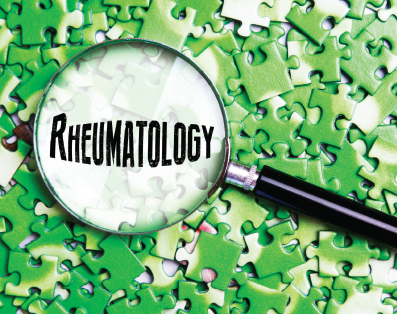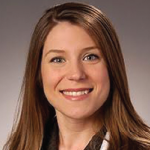
Laborant / shutterstock.com
When Jeanne Scott first entered nursing school, she planned to become a women’s health nurse practitioner. She was not expecting her final clinical placement in rheumatology to change the entire course of her career.
“Truthfully, I did not understand what rheumatology practitioners did until this introduction to the field,” says Ms. Scott, who describes being quite taken early on by the fact that rheumatology requires practitioners to be fluent across multiple specialties because of the nature of autoimmune diseases.
Now a board-certified adult geriatric primary care nurse practitioner, Ms. Scott was afforded the chance to learn and observe alongside rheumatology fellows, something that had not happened during her other rotations. “This presented an excellent opportunity for me to experience training from a different angle due to it being a completely different model than nursing,” she explains. “I was immediately intrigued by the methodology, diagnoses and treatments.”
Entrée to Rheumatology

Ms. Scott
Ms. Scott joined the ARHP while she was still a master’s student at Massachusetts General Hospital Institute of Health Professions in Boston. Membership allowed her to network quickly and meet other nurse practitioners in the field. “I was even lucky enough to be invited to the practice of an ARHP nurse practitioner to see how she functioned in an outpatient setting,” Ms. Scott says, noting the experience solidified her resolve to remain in rheumatology.
After graduation, the Massachusetts native moved to Rhode Island to begin work in a private practice setting (ultimately, the practice was absorbed into a larger hospital system). She describes being totally immersed in rheumatologic care, seeing patients full time and spending her nights and weekends studying “the different concepts, guidelines and treatment modalities within the field.” The ACR website served as a “significant resource” for her during this phase of her career.
“I treated that time like my own, personal fellowship,” Ms. Scott says. “It did not matter how busy my mentoring doctor became or how hectic the schedule proved to be during the day; I was always given the time I needed to grow and ask questions. The environment really allowed me to both test and push my limits.”
‘The ARHP has been a significant resource for me in my professional life, as well as a place where I have made many long-lasting friendships.’ —Ms. Scott
Volunteer Ops
Later, Ms. Scott got involved in a newly formed task force within the ARHP charged with creating a curriculum for nurse practitioners and physician assistants entering, or interested in entering, rheumatology. One of the goals of the curriculum is to help talented professionals successfully transition into the field, Ms. Scott says.
She continues to volunteer with the ARHP, now serving on the Annual Meeting Planning Subcommittee. She describes her experience as a real eye-opener because it has exposed her to the “tireless work and effort that goes into bringing the Annual Meeting together,” Ms. Scott explains. “It is a labor of love and passion by all involved.”
Ms. Scott works as a rheumatology nurse practitioner at an outpatient clinic for Dartmouth-Hitchcock, a health system in New Hampshire, where she performs joint injections and musculoskeletal ultrasound and helps provide care in an infusion unit. She is also passionate about performing health-related education in her community.
She continues to find inspiration in the ARHP, especially at Annual Meetings. “My practice continues to evolve and is consistently influenced by both publications and other members of the ARHP,” Ms. Scott explains. “I love meeting with other members and hearing how they approach patient care and the populations they treat. I’m constantly inspired by the work others in the ARHP are doing.”
Ms. Scott describes the ARHP as a “tight-knit, inclusive community that is there to support you in your endeavor to become the best provider possible for your patients.” She says the early years of practice are likely to be challenging for new providers, but the resources and people in the ARHP can help you make “a smoother transition from student to professional.”
The organization also provides more experienced rheumatology professionals the latest tools and information for their practices, Ms. Scott adds. “The ARHP has been a significant resource for me in my professional life, as well as a place where I have made many long-lasting friendships.”
Ms. Scott turns to the online ARHP and Rheum2Learn modules when she is looking for a refresher on various diagnoses and topics. And her involvement in the ARHP has also had significant impact on the continuing education she has sought out over the past few years. For example, after learning that ultrasound can benefit patients with rheumatic disease, Ms. Scott attended a highly recommended musculoskeletal ultrasound injection course in Ohio.
After Work
Although she continues to love her chosen career, working in rheumatology can lead to intense work weeks, Ms. Scott says. Living in the mountains of New Hampshire has provided her with opportunities to relax and stay grounded, serving as a great fit for her adventurous spirit.
“The hiking, skiing and outdoor life are phenomenal here,” she explains. A walk in the woods and a family picnic by the river are great ways for her to decompress, too.
An avid reader and lover of travel, Ms. Scott also likes to think of herself as something of a paleo culinary genius, and in saying so, she also reveals her sense of humor. “The latter may be debatable,” she teases.
What is not debatable is Ms. Scott’s passion for her work, nor her deep concern for her patients. But she wears many hats. “Being a mom is my favorite,” she says. “My daughter certainly knows how to keep me living in the moment.”
Kelly April Tyrrell writes about health, science and health policy. She lives in Madison, Wis.



